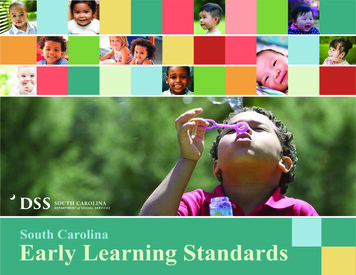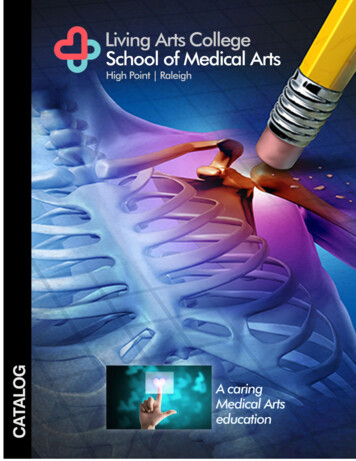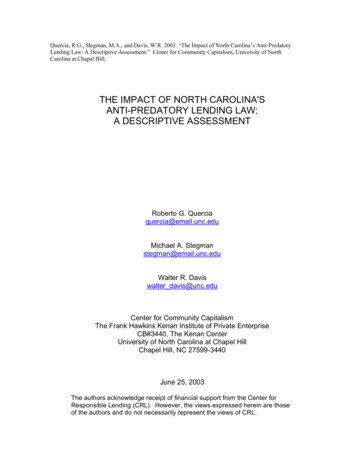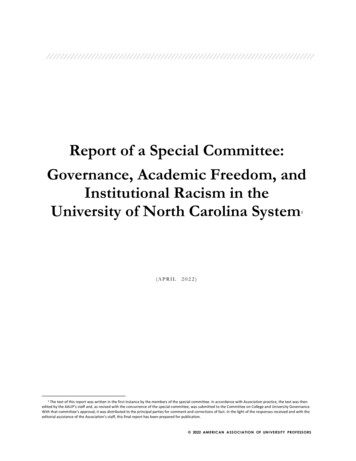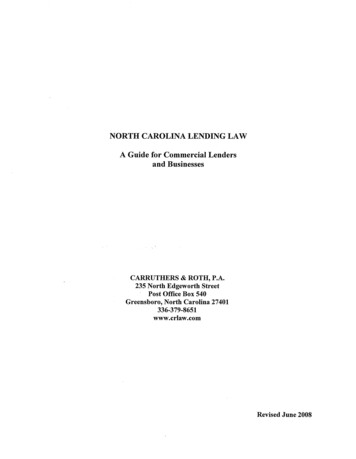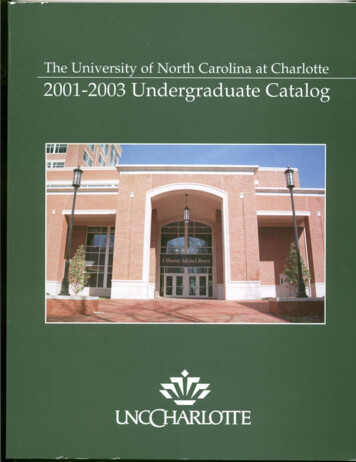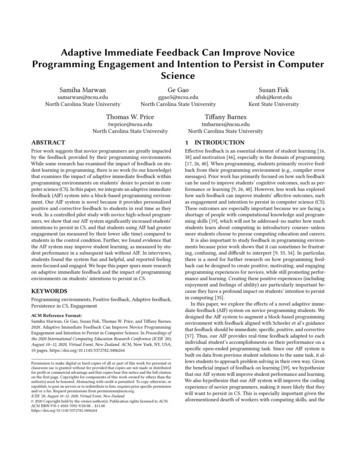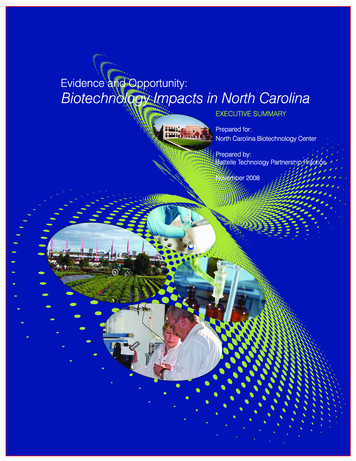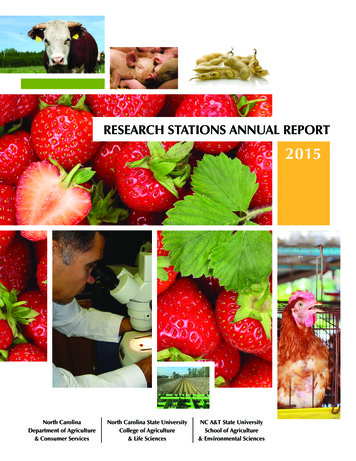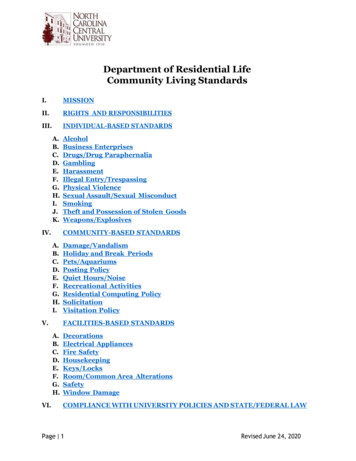
Transcription
Department of Residential LifeCommunity Living StandardsI.MISSIONII.RIGHTS AND RESPONSIBILITIESIII.INDIVIDUAL-BASED STANDARDSA.B.C.D.E.F.G.H.I.J.K.IV.COMMUNITY-BASED ay and Break PeriodsPets/AquariumsPosting PolicyQuiet Hours/NoiseRecreational ActivitiesResidential Computing PolicySolicitationVisitation PolicyFACILITIES-BASED STANDARDSA.B.C.D.E.F.G.H.VI.AlcoholBusiness EnterprisesDrugs/Drug ParaphernaliaGamblingHarassmentIllegal Entry/TrespassingPhysical ViolenceSexual Assault/Sexual MisconductSmokingTheft and Possession of Stolen GoodsWeapons/ExplosivesDecorationsElectrical AppliancesFire SafetyHousekeepingKeys/LocksRoom/Common Area AlterationsSafetyWindow DamageCOMPLIANCE WITH UNIVERSITY POLICIES AND STATE/FEDERAL LAWPage 1Revised June 24, 2020
I.MISSIONThe purpose of the Community Living Standards is to outline the rights andresponsibilities designed to create a positive living and learning environment within theresidence halls. The Community Living Standards are a legally binding adjunct to theHousing Agreement. You are equally responsible for complying with the rules, policies,and regulations that appear here as you are for those directly printed on the HousingAgreement. Provisions may be added, revised, changed during the term of the HousingContract with appropriate prior notification to residents.STANDARD RESPONSIBILITY**Special Covid-19 Health & Safety InformationGuidance from the Center for Disease Control (CDC) Guidance Document for Shared orCongregate Housing will be followed, as outlined below: Residents should practice distancing and wear face coverings in shared spaces,including lobby, elevators, computer labs, hallways and restrooms. No visitors will be allowed within the residence halls unless authorized for specificactivities such as help with move-in. Residential students are only permittedentrance to their own residence hall.For your safety and the safety of your roommate and neighbors, wearing face covering isthe responsibility of each student:Guidelines for using a face covering Wash hands or use hand sanitizer prior to handling the face covering Ensure the face covering fits snugly If the face covering has a nose wire ensure it is molded snugly around the nose Tie straps behind the head and neck or loop around the ears. Avoid touching the front of the face covering Do not touch your eyes, nose, or mouth when removing the face covering/disposablemask Wash hands immediately after removing and storing or disposing of the face coveringMaintaining face coverings Keep face covering stored in a paper bag when not in use Cloth face coverings should be laundered on a regular basis Disposable masks are disposed of at the end of each/ day Replace any face covering that becomes soiled or damaged (e.g., stretched ear loops,broken tie, torn or punctured materialsPage 2Revised June 24, 2020
Campus Visitor ProcessTo limit the potential exposures of our students, faculty and staff to COVID-19, NCCU requiresthat all visitors to campus undergo a pre-screening process. The link to this screening is providedby a campus contact (Area Coordinator) and must be completed by all visitors each day they needto be on campus. After completing the survey, both the visitor and the campus contact will receivean APPROVED or REJECTED email based on your answers to the survey.II.RIGHTS AND RESPONSIBILITIESThe Department of Residential Life recognizes that students living in residentialcommunities have certain rights that are not to be infringed upon by fellow communitymembers at any time. These rights include: The right to practice distancing and wear face coverings in shared spaces including lobby,elevators, hallways, laundry rooms, etc. The right to sleep during the night. The right to study in rooms, apartments, and common areas without beingdisturbed during hours designated as “quiet hours”. The right to be informed of community events or planneddisruptions. The right to have well-maintained facilities The right to access one’s living space during all times their building isopen. The right to privacy. The right to redress grievances.The Department of Residential Life recognizes that students living in residentialcommunities have certain responsibilities in their relationship to other communitymembers and to their environment. These responsibilities include: Practicing social distance and wear face coverings in shared spaces including lobby,elevators, hallways, laundry rooms, etc. Avoiding actions which inhibit another community member’s ability to sleep andstudy during quiet hours. Maintaining one’s self in a manner that is not disruptive to the community. Working with roommates and neighbors to settle disputes and disagreements in atimely and efficient manner. This may include working together on roommateagreements or neighbor agreements. Seeking help for themselves and/or others when necessary. Addressing University staff in a timely, respectful, and appropriate manner,including both verbal and written responses.Page 3Revised June 24, 2020
III.INDIVIDUAL-BASED STANDARDSA.AlcoholPersons 21 years of age may consume alcoholic beverages in their residence room, suiteor apartment or in another room, suite or apartment with an assigned occupant who ispresent and also 21 years of age. Alcohol containers, empty or otherwise, are notpermitted in rooms where occupants are under 21, and should not be used as a form ofdecoration. Persons are prohibited from possessing open containers or consumingalcoholic beverages outside the designated residential areas or in common spaces withinresidential areas. Common source containers are prohibited. No person of any age maymanufacture and/or sell alcoholic beverages in the residence halls or adjoining property.For specific information on North Carolina Central University’s policies regardingalcohol, please see the Student Code of Conduct.For information on Medical Amnesty, please refer to the Alcohol Medical AmnestyRegulation.B.Business EnterprisesPersonal business enterprises shall not be conducted in or from the University residentialfacilities, including Internet related business operations.C.Drugs/Drug ParaphernaliaThe transport, possession, possession with intent to deliver, delivery, manufacture,purchase, sale, distribution, or use of illegal drugs or controlled substances is prohibited.Prescription drugs may only be taken by patients for the intended use and in theprescribed manner as directed by their physician.Possession of drug-related paraphernalia is prohibited.For specific information on North Carolina Central University’s policies regarding illegaldrugs, please refer to the Policy on Illegal Drugs and the Student Code of Conduct.D.GamblingGambling is not permitted in the residence halls.Unless approved by the Area Coordinator, the sponsoring of raffles or selling tickets isnot permitted.E.HarassmentHarassment, defined as any physical force, violence, threat, intimidation, stalking, orother behavior that interferes with an individual’s personal safety, academic efforts,employment, or participation in University-sponsored activities, is strictly prohibited.This includes, but is not limited to harassment in person, harassment by an accomplice,and harassment by the use of technology.Page 4Revised June 24, 2020
No North Carolina Central University employee or student may engage in conduct thatconstitutes sexual harassment.Sexual harassment is defined in North Carolina Central University’s Sexual MisconductPolicy as follows:Unwelcome sexual advances, requests for sexual favors and other verbal or physicalconduct or communication of a sexual nature when:(i)submission to or rejection of such conduct or communication is a term orcondition of education/employment benefits, academic/job related evaluations oropportunities;(ii)submission to such conduct or communication substantially interferes with astudent’s education and/or an employee’s job; or(iii)such conduct is sufficiently severe, pervasive, and objectively offensive as to havethe effect of creating an intimidating or hostile educational/work environment ornegatively affects a student’s/employee’s educational/employment opportunities.Sexual harassment does not include personal compliments normally welcomed bypersons of that sex, or social interaction or relationships freely entered into by universityemployees and students or student applicants.F.Illegal Entry/TrespassingUnauthorized entry into any Residential Life property, including restricted access areasof residence halls, is strictly prohibited. These areas include, but are not limited to, anyplace that is officially closed, restricted only to designated persons (including otherresidents’ rooms), or where the safety and welfare of residents could be endangered.Examples of restricted areas include mechanical rooms, telecom rooms, roofs, closedbuildings, housekeeping closets and storage areas.G.Physical ViolencePhysical violence or conduct that threatens the health and safety of one’s self or any otherperson in or around the residence hall community is prohibited.H.Sexual Assault/Sexual MisconductSexual assault and sexual misconduct are prohibited. Sexual assault and sexualmisconduct in their various forms are defined under the North Carolina CentralUniversity’s Sexual Misconduct Policy.I.SmokingSmoking is prohibited in residence halls and on all residential hall property within 25feet of the facility.J.Theft and Possession of Stolen GoodsTheft of any kind or the possession of stolen property is prohibited. Theft or unauthorizedPage 5Revised June 24, 2020
possession of university owned furniture or property is prohibited.K.Weapons/ExplosivesPossession, storage, manufacture, use, sale or distribution of firearms, fireworks,explosive material, ammunition, BB and pellet guns, paint guns, knives, martial artsweapons, and all other dangerous weapons are prohibited. Any item that intentionallyresembles an actual weapon is not allowed. For reasons of safety, explosives are notpermitted in the residence halls.IV.COMMUNITY-BASED STANDARDSA.Damage/VandalismVandalism is not permitted in or around residence hall areas.Unintentional damage to residence hall areas should be reported immediately to yourRA, the community desk or Area Coordinator.Damages will be billed to the responsible individual. When the responsibleindividual(s) cannot be identified, the residents of the entire hall, floor,wing, or suite will be collectively responsible.B.Holiday and Break PeriodsDuring times when residence halls are closed for break periods, entry or attempted entryby residents is prohibited.Residents are responsible for knowing and complying with break period guidelines setforth by their community.C.Pets/AquariumsPets other than fish are prohibited in the residence halls.Residents are permitted to keep fish in their room providing: (a) the fish tank is freshwater and its size does not exceed 12 U.S. gallons; (b) all residents of the room agree tohave a fish tank in the room; and (c) all appropriate precautions are taken to ensure thatthe electrical connection to the fish tank is safe.This policy does not apply to persons with a disability that require the use of a serviceanimal or emotional support animals. If you require the use of a service animal, approvalfrom the Office of Student Accessibility Services must be submitted to the Department ofResidential Life.D.Posting PolicyNo one, with the exception of community staff or a member of hall council may post ordistribute materials on campus, including in any residential community, andLeadership.Authorization/approval requires a stamp (provided by Student Engagement andLeadership) on each item to be distributed. The requestor must provide a hard copy ofPage 6Revised June 24, 2020
the posting as well as individual contact and organization information with each request.Materials deemed harassing, harmful to the community, or promoting at risk behavioror conduct that violates any University policies, regulations, rules and/or federal or statewill not be approved for posting.E.Quiet Hours/NoiseQuiet Study Hours occur daily between 10:00pm and 10:00am. During this time, noisemust be kept at levels that will not interfere with the study or sleep of other residents.Quiet Hours is extended to 24 hours during final exams.Excessive noise is defined as any unreasonable noise level that can be heard insideand/or outside of the residence hall room or space from which it originates and is notallowed at any time.Courtesy quiet hours are in effect 24 hours a day, 7 days a week.Placement of sound equipment in windows is prohibited.F.Recreational ActivitiesAny activity that includes throwing an object or running in the halls is not allowed.Riding a bike, skateboarding, floor hockey, or rollerblading and engaging in sports,including, but not limited to, water fights, Frisbee throwing, horseplay, ball bouncing,golf clubs, basketball playing, etc. are prohibited inside all residence hallsG.Residential Computing PolicyResidents of campus housing who register for Ethernet or wireless connectivity agree toabide by the Information Technology Services (ITS) Responsible Use Regulation.Misuse or tampering with an Ethernet or wireless connection is prohibited.H.SolicitationOnly recognized student groups are permitted to canvass, sell solicit, or promote the saleof goods or services in the residence halls. Recognized student groups must have receivedprior written approval from the Executive Director of Residential Life.Campaigning for campus student leadership positions must meet regulations set forth bythe Elections Board of Student Government.I.Visitation PolicyThe Visitation policy is a shared responsibility between residents of a community andresidential staff. Students are encouraged to notify their RA or Area Coordinator ofpotential violations of this policy in a timely manner. Visitation occurring between residents who reside in the same hall is prohibited.This means residents in the same hall cannot visit each other in their rooms. Visiting students in other residence halls is prohibited.Page 7Revised June 24, 2020
Visitation from non-campus residents including other NCCU students is prohibited. Visitation from parents/guardians is permitted under certain circumstances. A requestmust be submitted to your Area Coordinator three business days in CCentralUniv&layout id 17 Overnight guests are prohibited including parents/guardians/family members. Habitation of a room by anyone other than an individual assigned to that room isprohibited.V.FACILITIES-BASED STANDARDSA.DecorationsWhen decorating exterior room doors or common areas, the Department of ResidentialLife requires that residents avoid posting materials that would constitute harassment ordiscrimination on the basis of race, color, gender, national origin, age, religion, creed,disability, veteran’s status, sexual orientation, gender identity or gender expression.Decorations that may obstruct traffic and may potentially be a fire hazard (e.g. liveChristmas trees) are not permitted in rooms, hallways, and suite corridors.Hallway and suite decorations may be placed on resident room doors, bulletin boards,and in spaces approved by your RA and /or Area Coordinator.Lobby and lounge decorations must be approved through the Area Coordinator.Decorations may not be placed within two feet of a fire protection system component (i.e.manual pull station, smoke detector, bell/horn/strobe/sprinkler, fire extinguisher, exitsign, emergency lighting, or any egress doorway).Room and exterior room door decorations and wall hangings may only be hung with nondamaging materials or removable hangers and must not cover more than one third of thetotal door or wall space.B.Electrical AppliancesEach individual residence hall room is restricted to a maximum of 1800 watts usage atany time.No single appliance can exceed 1000 watts or have an exposed heating element.Two refrigerators are permitted in each room; however, it may not exceed 4.5 cubic feetin capacity with an electrical rating of 120 volts and no more than 2.0 amps when inoperation. Only one micro-refrigerator is permitted in each room.No microwaves are permitted in the residence hall roomsHalogen and octopus lamps are expressly forbidden in the residence halls.Extension cords are not permitted in the residence halls.See Guide to Campus Living- what to bring and what not to bring.Page 8Revised June 24, 2020
C.Fire SafetyStarting a fire; activation a fire alarm without due cause; tampering with smoke/heatdetectors; fire extinguishers, sprinkler heads; falsely reporting a fire emergency to policeor fire department; and the unauthorized use or damage done to any emergency or safetyequipment, are all prohibited.The use of fire equipment for any reasons other than its intended purpose (e.g. sprinklersshould not be used to hang clothes, covering smoke detectors) is prohibited. Studentswill be held financially responsible for any damages and cleaning charges resulting fromthe unauthorized activation of the sprinkler system and subject to student conductaction.In the event of a fire alarm or fire drill, all residents must evacuate the buildingcompletely and immediately. Residents must remain outside at the building’s designatedassembly point until instructed by fire department officials or University staff that theymay re-enter. Balconies, hallways, and stairwells must have clear passage at all times.Storage of any item(s) that may pose a fire hazard in a residence hall room is prohibited.Items may include, but are not limited to any open flame source (i.e. celebratory candlesor decorative candles), incense, hookah pipes, live cut trees (e.g. Christmas Trees) orflammable liquids. The possession or use of combustible materials (e.g. hay, straw,Spanish Moss, cloth ceiling coverings) is prohibited.Because of the fire hazard they represent, two prong extension cords, plug adapters, andhalogen lamps and bulbs are prohibited. Residents using extension cords must usegrounded three wire extension cords and/or surge protectors. Space heaters areprohibited in residence hall rooms.Splicing into or altering the electrical wiring in a residence hall is prohibited.D.E.Housekeeping Residents are responsible for the cleanliness of their rooms and/or suites. Building residents and their guests are responsible for cleanliness of commonareas. Residents may not leave personal trash or pizza boxes in any public or shared areas(e.g. bathrooms and hallways). Residents are responsible for removing their trash and/or recycling to designatedoutdoor trash containers on a regular basis as need to prevent health and safetyconcerns. Residents are not permitted to store items in public or shared areas (e.g. hallwaysand bathrooms).Keys/LocksPage 9Revised June 24, 2020
Unauthorized use, possession, or duplication or residence hall keys are strictlyprohibited. Switching and/or borrowing keys with another resident for any reason, including,unauthorized room changes, is prohibited. To conduct a proper re-assignment,residents should contact their Area Coordinator. Failure to report lost keys is prohibited. Residents are allowed three (3) grace key lockouts without penalty. Furtherlockouts will be allowed but require an Area Coordinator conversation.F.Room/Common Area Alterations Students are responsible for returning their furniture to the designated positionsat the end of the year as set forth by the community office. Adhesive tape, staples, adhesive holders, brackets, tacks, and nails are not tobe used on the walls, woodwork, floors, or ceilings. Furniture is not to be removed for use in spaces other than its originallocation. Removal of residence hall room furniture from the room isprohibited. Waterbeds are not permitted in the residence halls. Residents are not allowed to paint any interior or exterior area of anyresidence hall space. Additional locks may not be added to doors or other University property orequipment. Damages that result from making room or common area alterations will be billedto the appropriate residents. Damaged or missing furniture in public areas may be subject to group damagecharges to all residents of the floor or buildings.G.Safety Breaking the plane of a window, breezeway or balcony is not allowed by a personor an object. The throwing, dropping, propelling, pouring or handing of anything fromwindows, balconies, ledges, rooftops, and landings is strictly prohibited. Climbing and repelling on any housing property is prohibited. Following a building resident into a residence hall that is not of your own(“tailgating”) is prohibited. Propping open exterior doors creates a potential unauthorized entry, promotingPage 10Revised June 24, 2020
an unsafe living environment, and is prohibited.H. Pranking that causes harm or the potential for harm is prohibited. Precautionary steps should be take while cooking including turning on vents(where applicable), opening windows, and closely monitoring cooking food.Window DamageTampering with or removing any window screens, latches, stops, or apparatus in eitherresident rooms or public areas is prohibited.VI.COMPLIANCE WITH UNIVERSITY POLICIES AND STATE/FEDERAL LAWViolation of a University policy, regulation or rule; the honor code; town ordinance; orstate or federal law is prohibited.Failure to comply with verbal, written, or published instruction by University staff, whensuch officials are working within the appropriate performance of their duties, isprohibited.Abusive behavior that is threating and directed toward University staff is prohibited.Residents and approved guest(s) are required to present proper University identificationor government issued identification to University staff in a cooperative manner whenrequested.It is a violation to knowingly supply University staff with false or misleading informationthat is needed for an official purpose, including the misrepresentation of identity ormisuse of identification cards.There are several other guidelines set forth by the Department of Residential Life. Theseinclude but are not limited to content included in our housing agreements, website, andverbal or written instructions from staff members. These guidelines are considered partof the Community Living Standards.Failure to adhere to Community Living Standards may result in termination of housingcontract as well as referral to Office of Student Conduct and Community Standards orpotential violations of the student code of conduct.Page 11Revised June 24, 2020
The purpose of the Community Living Standards is to outline the rights and responsibilities designed to create a positive living and learning environment within the residence halls. The Community Living Standards are a legally binding adjunct to the Housing Agreement. You are equally responsible for complying with the rules, policies,
